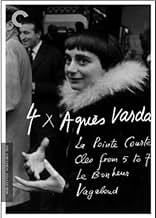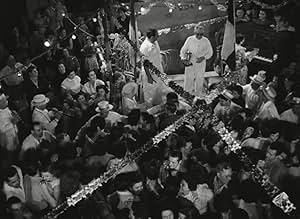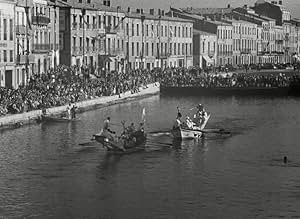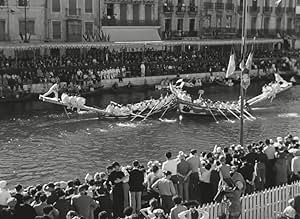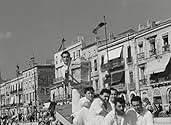CALIFICACIÓN DE IMDb
7.0/10
4.7 k
TU CALIFICACIÓN
Una historia que entreteje las vidas de un pueblo pesquero y de una pareja, en la que ella es de París y él un hombre nativo.Una historia que entreteje las vidas de un pueblo pesquero y de una pareja, en la que ella es de París y él un hombre nativo.Una historia que entreteje las vidas de un pueblo pesquero y de una pareja, en la que ella es de París y él un hombre nativo.
- Dirección
- Guionista
- Elenco
- Dirección
- Guionista
- Todo el elenco y el equipo
- Producción, taquilla y más en IMDbPro
Opiniones destacadas
10zetes
This film, Varda's directorial debut, is as impressive and accomplished as any of the other New Wavers' debuts. It's definitely on the same level as Jean-Luc Godard's Breathless, Francois Truffaut's The 400 Blows, or Alain Resnais's Hiroshima, Mon Amour (Resnais actually worked as the editor for this film). I actually think I prefer it to all three of those (as well as the other three films of Varda's that I've seen). Historically, it's one of the most fascinating films I've ever witnessed. It, in one of its two sections, sprouts from a mixture of both French Poetic Realism of the 1930s and Italian Neorealism in the 1940s. It contains the social drama of such Neorealism classics as Visconti's La Terra Trema, as this plotline deals with a group of poor fishermen and their families. However, Varda doesn't play this hand melodramatically at all. Even when a character dies, we only witness his mourning in a precisely documentarian way. We aren't asked to feel any real emotion for him, which, for some reason, makes it all the more profound. In this way, the film resembles the French poetic realism classics. L'Atalante is clearly echoed, as stray cats occupy many empty spaces in the composition; they appear in nearly every scene in some capacity. Also, the village festival that takes up most of its tail end resembles very much the folksy rural wedding at the beginning of L'Atalante. The film also contains the good humor of Vigo's masterpiece. The second half of the film alternates with the first, switching over exactly every ten minutes, a technique which Varda kind of pilfered from William Faulkner's Wild Palms (aka If I Forget Thee, Jerusalem), a novel which Godard brings up in two of his films, Breathless and Two or Three Things I Know About Her. This second half points toward the future. The French New Wave, just getting underway in 1956 (although the program notes that I received insisted that it was made in 1954), comes to full bloom here. This half, which deals with a husband and wife who have started to grow tired of each other, consists of beautifully choreographed and composed shots of the two lovers strolling along the beaches of the fishing town. The style here is instantly recognizable as one which Resnais would adopt in Hiroshima Mon Amour and Last Year at Marienbad, and even has that semi-resigned feeling to it, as if, in a way, it's half-joking. What's really shocking is that this section does not just predict some of the techniques of the French New Wave, but also the style of Ingmar Bergman's films. I would doubt that Bergman was influenced at all by this film, as it's doubtful he ever saw it. Besides, he was well on his way to hitting his peaks by 1954, as we can see from such early masterpieces as Sawdust and Tinsel. But there are some shots in this film that, once again, will instantly call to mind nearly identical ones from films such as The Seventh Seal and, even more so, Persona.
While it's a lot of fun to identify these old and new (and future) trends in La Pointe Courte, the film more than stands up on its own. Besides, according to the program notes, Agnès Varda was no great cinephile, unlike the other French New Wavers. The two storylines, and their differing styles, complement each other perfectly. It helps that Varda's direction is impeccable. Before she came to the cinema, she was a photojournalist, and it's extremely obvious. Her composition is absolutely stunning, with a lot of concentration on surface textures. The film opens with a tight close-up of a handcrafted wooden chair. You can't tell what it is initially, but as the camera follows the grooves and backs up, the object is revealed for what it is. When one character goes to the train station to pick up his wife, the shot is absolutely award-worthy with its multiple diagonals in the train tracks and the power lines in the distance. The use of sound in the film is also amazing. It's interesting when sound effects are included and when they're occluded. When the married couple walks through a field, there are carts squeaking down rusty tracks (it's a very odd event, but quite remarkable to see and hear). But later, when a large train passes by them only a dozen feet away, we don't hear it at all. Godard would play with sound more thoroughly, but never as subtly.
It's a rather great tragedy that La Pointe Courte has gone almost entirely unavailable. It barely got a release when it was first made, and, even after Varda gained prominence in the French cinema, it seems to have effectively dropped off the face of the planet. I hope that someday there will be a full retrospective of her work on DVD. This film deserves to impress others as much as it impressed me. 10/10.
While it's a lot of fun to identify these old and new (and future) trends in La Pointe Courte, the film more than stands up on its own. Besides, according to the program notes, Agnès Varda was no great cinephile, unlike the other French New Wavers. The two storylines, and their differing styles, complement each other perfectly. It helps that Varda's direction is impeccable. Before she came to the cinema, she was a photojournalist, and it's extremely obvious. Her composition is absolutely stunning, with a lot of concentration on surface textures. The film opens with a tight close-up of a handcrafted wooden chair. You can't tell what it is initially, but as the camera follows the grooves and backs up, the object is revealed for what it is. When one character goes to the train station to pick up his wife, the shot is absolutely award-worthy with its multiple diagonals in the train tracks and the power lines in the distance. The use of sound in the film is also amazing. It's interesting when sound effects are included and when they're occluded. When the married couple walks through a field, there are carts squeaking down rusty tracks (it's a very odd event, but quite remarkable to see and hear). But later, when a large train passes by them only a dozen feet away, we don't hear it at all. Godard would play with sound more thoroughly, but never as subtly.
It's a rather great tragedy that La Pointe Courte has gone almost entirely unavailable. It barely got a release when it was first made, and, even after Varda gained prominence in the French cinema, it seems to have effectively dropped off the face of the planet. I hope that someday there will be a full retrospective of her work on DVD. This film deserves to impress others as much as it impressed me. 10/10.
La Pointe Courte is a small jut of land on the east side of Le Canal de Sète, which connects L'Étang de Thau to the Mediterranean Sea. In the mid-1950s, it harbored a small fishing village (perhaps it still does, for all I know) which provides the setting for this film. Written and directed by 26-year old Agnès (née Arlette) Varda, this, her first and perhaps her best film, is credited by some film critics and historians as the first in the French New Wave.
A young (24) Philippe Noiret plays a native of the village who returns from Paris after many years for a short vacation. Heretofore, I was familiar with Noiret only with some of his much later films. Silvia Monfort, with whom I was previously unfamiliar, and who had one of the most unusual faces I've seen on film, plays the disillusioned Parisian wife who joins him five days later to discuss their marriage.
What's interesting about this film are its two intertwining parts. One part, shot in a familiar narrative style, concerns the everyday life and concerns of the villagers. The other part depicts the conversations of the couple in an artistic style full of fascinating images and interesting camera angles, a style which takes full advantage of Varda's photographer's eye. (Varda used three different cinematographers on this shoot, but I don't know which of them photographed which scenes.)
Varda chose the location for the film after a visit there for an assignment as a still photographer. What I liked best about the part involving just the couple were the slow pans of the environments, almost as if Varda were trying to capture the characters' surroundings in a series of stills. On the other hand, I found somewhat disturbing the obtrusive soundtrack of a clarinet, which went counter to the notion that a soundtrack is supposed to enhance the mood of the scene, not play against it as I found this to do. Perhaps that is part of what accounts for this being credited as a New Wave film.
A young (24) Philippe Noiret plays a native of the village who returns from Paris after many years for a short vacation. Heretofore, I was familiar with Noiret only with some of his much later films. Silvia Monfort, with whom I was previously unfamiliar, and who had one of the most unusual faces I've seen on film, plays the disillusioned Parisian wife who joins him five days later to discuss their marriage.
What's interesting about this film are its two intertwining parts. One part, shot in a familiar narrative style, concerns the everyday life and concerns of the villagers. The other part depicts the conversations of the couple in an artistic style full of fascinating images and interesting camera angles, a style which takes full advantage of Varda's photographer's eye. (Varda used three different cinematographers on this shoot, but I don't know which of them photographed which scenes.)
Varda chose the location for the film after a visit there for an assignment as a still photographer. What I liked best about the part involving just the couple were the slow pans of the environments, almost as if Varda were trying to capture the characters' surroundings in a series of stills. On the other hand, I found somewhat disturbing the obtrusive soundtrack of a clarinet, which went counter to the notion that a soundtrack is supposed to enhance the mood of the scene, not play against it as I found this to do. Perhaps that is part of what accounts for this being credited as a New Wave film.
La Pointe-Courte was the first feature written, edited (in part, with Resnais) and directed by Agnes Varda, but she came previously from still photography, and her clarity, empathy and specificity with a place and it's many details, from the rocks of the shore to how the water shimmers to the plethora of cats (and of course someone even comments on that), is evident right away. At time of writing this, I don't know the full backstory of how she came to become close and immerse herself with the people in this seaside town or village or whatever you call it, but they clearly are open to her and welcoming for her to see and show us all how they fish and talk among themselves and discuss matters important to them- such as outsiders coming in to tell them what to do. And sometimes we get to look close at a detail like how small snakes and crabs go into a bucket.
I don't think Varda would use this term, but like La Terra Trema or Stromboli, it's a depiction of a time and place, in crisp black and white 35mm film, that is authentic and unvarnished and a bit neo-realist-y. She also places a love story at the center which is coming apart at the seams, and in case it isn't clear the man and the woman walk and talk for minutes on end and speak on their hopelessness for their relationship (or more the woman than the man, he would like for it to work and she sees nothing productive ahead).
This is shot at points like a director figuring out what a style will be, and there are a few times shots are styled to be reflective of the characters abstract feelings, perhaps to each other. When the woman talks to her man, who will soon be her ex, she does that thing Bergman would do a decade later where her face is split down the middle by the man looking the other way (so like him one way her another but not at each other), and he does so too. Or with the two of them carrying on their conversation facing the camera in different places shot to shot. This latter part works well, in a poetic-detached sort of way. The other proto Bergman ones, maybe not so much.
Like watching Kubrick with Killer's Kiss or Fear and Desire, the fascination is getting a look at the Start of it all from a talent with a sharp, dramatically alive set of eyes, and in here where the sensibility of Varda was as someone who, in her case and in what I find very inspiring in the opposite way of like a Scorsese or his ilk, wasn't inspired or taking in homage from other films. From what I've read, she wasn't a Film Buff like the other Nouvelle Vague who would come up after and with her, and was just inspired more by what she was interested in: working class people who work hard and live hard and are noble, the delicacy in the poetry of movement, and cats. If this film is a little less than great or just compared to her other films it's that the strengths lie in the more documentary aspects. The (falling apart) love story is sincere but less convincing, maybe because the actors are mostly the same morose-detached tone for the entire time.
La Pointe-Courte is a very impressive debut, and for what it may be lacking in satisfying relationship scenes it more than makes up for with everything, all the local people and their minor joys and sadness and world weariness around the central characters. In other words, half of it is captivating because of the people Varda has found and made into movie stars, and the other half that is more like a "Film" is a bit more pretentious.
I don't think Varda would use this term, but like La Terra Trema or Stromboli, it's a depiction of a time and place, in crisp black and white 35mm film, that is authentic and unvarnished and a bit neo-realist-y. She also places a love story at the center which is coming apart at the seams, and in case it isn't clear the man and the woman walk and talk for minutes on end and speak on their hopelessness for their relationship (or more the woman than the man, he would like for it to work and she sees nothing productive ahead).
This is shot at points like a director figuring out what a style will be, and there are a few times shots are styled to be reflective of the characters abstract feelings, perhaps to each other. When the woman talks to her man, who will soon be her ex, she does that thing Bergman would do a decade later where her face is split down the middle by the man looking the other way (so like him one way her another but not at each other), and he does so too. Or with the two of them carrying on their conversation facing the camera in different places shot to shot. This latter part works well, in a poetic-detached sort of way. The other proto Bergman ones, maybe not so much.
Like watching Kubrick with Killer's Kiss or Fear and Desire, the fascination is getting a look at the Start of it all from a talent with a sharp, dramatically alive set of eyes, and in here where the sensibility of Varda was as someone who, in her case and in what I find very inspiring in the opposite way of like a Scorsese or his ilk, wasn't inspired or taking in homage from other films. From what I've read, she wasn't a Film Buff like the other Nouvelle Vague who would come up after and with her, and was just inspired more by what she was interested in: working class people who work hard and live hard and are noble, the delicacy in the poetry of movement, and cats. If this film is a little less than great or just compared to her other films it's that the strengths lie in the more documentary aspects. The (falling apart) love story is sincere but less convincing, maybe because the actors are mostly the same morose-detached tone for the entire time.
La Pointe-Courte is a very impressive debut, and for what it may be lacking in satisfying relationship scenes it more than makes up for with everything, all the local people and their minor joys and sadness and world weariness around the central characters. In other words, half of it is captivating because of the people Varda has found and made into movie stars, and the other half that is more like a "Film" is a bit more pretentious.
"The first tributary of its narrative bifurcation is an ethnological essay exploring the daily hurdles and weekend divertissements of the local folks, their livelihood (contending with policemen for fishing in an illegal lagoon nearby), their grief (mortality is high among a philoprogenitive household), their earthly concerns (a 16-year-old girl seeks the approval of her father for courtship), and their unalloyed joy (a jubilant aquatic jousting competition and its attendant festa are faithfully recorded with both intimacy and grandeur), all are enlivened through Varda's unobtrusive regard and well-posited lens."
read my full review on my blog: cinema omnivore, thanks
read my full review on my blog: cinema omnivore, thanks
I am not a film historian or a fan of Nouvelle Vague. I wanted to see this film because it gave me the opportunity to see my hero, Philippe Noiret, when he was just 26. Thankfully we began by watching the interview w/ Varda, which really gives you a solid understanding of why this film was/is so important, mostly having to do with it being so innovative for its time, and its place as an influence on filmmakers that followed. The 2 story lines did not engage or interest me really.But the visuals were often terrific. And oddly enough, we had just the night before, watched Clash by Night, an American film of the same time which was shot on location in the fishing community of Monterey CA. While visuals were often excellent there as well,in Clash by Night the film really was the STORY, and a very passionate one at that.
La Pointe-Courte was also really important as an example of one of the few important "First Films' of a director,especially a woman director in 1955 , and really especially, one who had no previous experience in film making and no knowledge of film history.
La Pointe-Courte was also really important as an example of one of the few important "First Films' of a director,especially a woman director in 1955 , and really especially, one who had no previous experience in film making and no knowledge of film history.
¿Sabías que…?
- TriviaThis film is considered by many critics as the starting point of the French New Wave film movement.
- ErroresThe entire movie has been shot without sound and dubbed later, and it shows. At several points in the movie, the dialogue does not match the lip movements at all. For instance, early in the movie, when Jules' wife tells the other woman that it was Jules who scared the inspectors.
- ConexionesFeatured in Great Directors (2009)
Selecciones populares
Inicia sesión para calificar y agrega a la lista de videos para obtener recomendaciones personalizadas
- How long is La Pointe Courte?Con tecnología de Alexa
Detalles
Taquilla
- Total a nivel mundial
- USD 1,596
- Tiempo de ejecución
- 1h 21min(81 min)
- Color
- Mezcla de sonido
- Relación de aspecto
- 1.37 : 1
Contribuir a esta página
Sugiere una edición o agrega el contenido que falta


